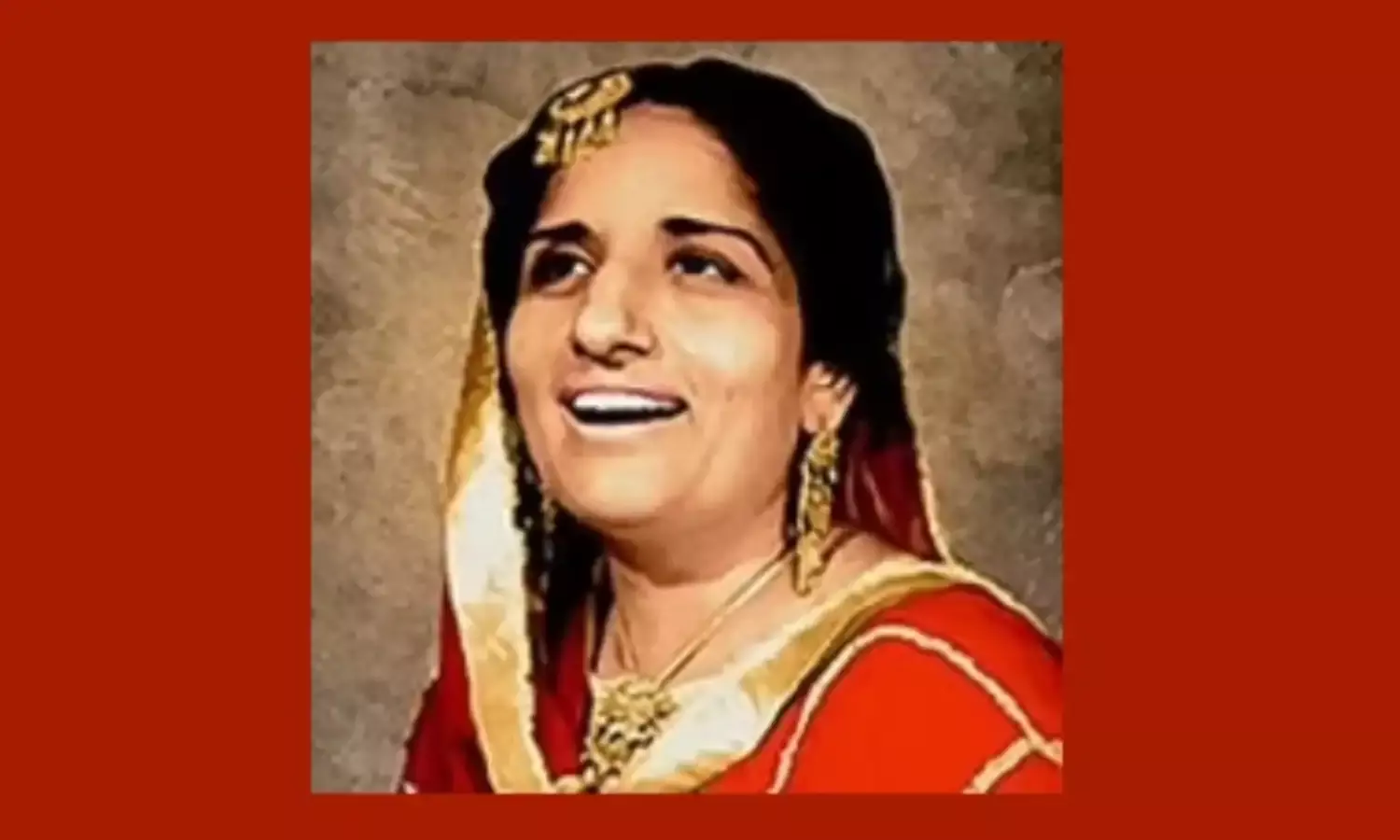Nightingale of Punjab
Remembering Surinder Kaur's contributions to Punjabi music;

She may have left us 16 years ago, but on her birth anniversary November 25, Surinder Kaur was remembered fondly by her countless admirers in India, Pakistan, Canada, UK, USA and several other countries as well. The contributions of the 'Nightingale of Punjab' to music can never be forgotten, all the more so in present times of degradation of Punjabi pop when the memories of her melodious songs appear like a golden era of Punjabi music. Surinder Kaur sang nearly 2000 songs in her distinguished career, even contributing to Hindi film music for a short with such unforgettable songs as Badnaam na ho jai muhabbat ka fasana (Shaheed).
Surinder Kaur's achievements are all the more remarkable considering that she came from a conservative middle-class Punjabi family where, at that time ( in 1940s), singing for women (other than holy songs or marriage songs) was taboo for women. Surinder and her elder sister Prakash had picked up their songs from their mother Maya Devi and their brother Harbans Singh played the liberating role in the family by creating the conditions in which the undoubted great talent of the two sisters ( and later a third sister Narinder) could be taken before a wider audience. However in the earlier days all the practice had to be done behind closed doors and windows.
Prakash being elder by about a decade was the first to get a breakthrough on Lahore Radio in pre-Partition days. Surinder soon followed in 1943 at the age of 14 only when the two sisters together sang the famous folk song Maavan te Dheeyan ral baithiya nee maye kar diyan gallan ( before the wedding day mother and daughter are sitting together for one last hearty conversation). This is a very emotional song in Punjabi culture giving voice to the innermost feelings of mothers and daughters and the two sisters sang it so soulfully that the well-known song in their voice became a big hit. There was no looking back after this.
Several years later at a stage show abroad Surin der was singing this song with her daughter Dolly Guleria and grand-daughter Sunaina Sharma. Mid-way through the song Surinder noticed that her daughter was crying. She thought that it may be difficult to continue the song. But when she looked ahead at the audience she found that many women in the audience were also crying. The song continued and ended on a note of unending applause.
Apart from deeply emotional songs entrenched in Punjabi and Indian family relations (including the almost equally famous Madhaniya, haayo mere daadiya rabba), Surinder sang songs of melody, romance, celebration, festive occasions and sufi thought. These included such famous numbers as Enna Akhiya, Lathe Di Chadar Utte Saleti, Kala Doria, Sarke Sarke Zaandiye Mutiyari, Chan Kithe Gujari and Shokan Mele Di.
Some of these songs have been sung by so many singers, and yet people yearn to hear them in the voice of the one and only Surinder. Apart from teaming up with her sisters, Surinder also sang duets with several male singers and particularly those sung with Asha Singh Mastana were a big hit. Rafi Sahib and Surinder also had high regard for each other, and Surinder had a lot of respect for her music teachers and composers as well.
Surinder Kaur's deepest relationship was with her husband Joginder Singh Sodhi, a very learned man, whom she called her 'friend, philosopher and guide'. Such was their relationship that after his early death she recalled later that she had never known the experience of any quarrel between husband and wife and wondered why such quarrels take place!
Sodhi introduced her to great poets and Surinder now also started singing songs based on the poems and lyrics of Amrita Pritam, Nandlal Noorpuri, Mohan Singh and Shiv Kumar Batlavi. She also sang for some operas of Sheela Bhatia.
Still her contribution to giving a new relevance to Punjabi folk music is probably most valuable as these songs reflect the innermost feelings and yearnings of Punjabi women but were largely confined to home-walls. Surinder and Prakash helped to bring them out to wider social spaces so that these feelings and yearnings could be shared more openly and widely.
It is an indication of the deeply human qualities of Surinder Kaur that she took it upon herself to take care of the family of long serving family cook and attendant Paan Dev, arranging for the marriage and education of his children. Many honors and awards came her way as a matter of routine almost, but she continued to be very accessible till her last days.
After Partition she had moved with her husband to Bombay for a short while but eventually settled in Delhi. Much later she came to Panchkula (where the eldest of her three daughters, Dolly, lived) and was planning to settle in Mohali when she fell seriously ill and went to the USA for treatment. It was here that she breathed her last in a hospital in June 2006.
A great singer and also a great human being, the 'nightingale of Punjab' will be remembered for a very long time with affection, respect and longing.

